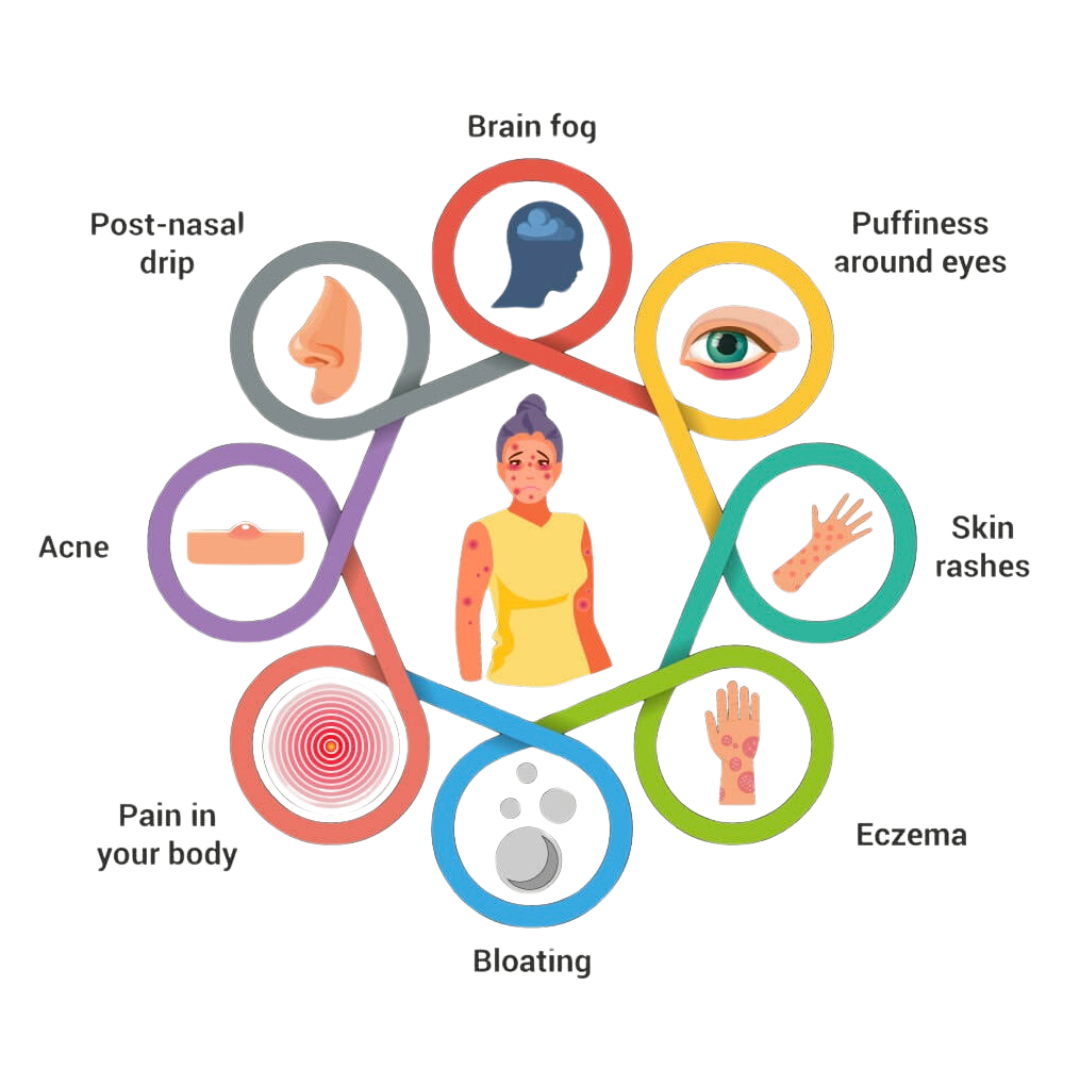
Are you struggling with health issues, chronic pain, or autoimmune symptoms, and you feel like you’ve tried everything to get some relief, but nothing is working long-term?
You’re not alone! May individuals face these challenges without understanding the root cause. Unknown food sensitivities could be affecting your health!
Food sensitivities can have a profound impact on your overall health, particularly by contributing to chronic inflammation, pain, and the development or exacerbation of autoimmune conditions.
Understanding this connection is crucial for anyone looking to improve their well-being and manage persistent health issues effectively. Here's a detailed explanation of how food
sensitivities play a role in these health challenges
Enroll today!
1. What Are Food Sensitivities?
Food sensitivities are adverse reactions to certain foods that occur hours or even days after consumption. Unlike food allergies, which involve an immediate immune response mediated by IgE antibodies, food sensitivities typically involve a delayed immune response and are often associated with IgG antibodies. These sensitivities can lead to various symptoms, ranging from digestive discomfort to systemic issues like inflammation and pain.

2. How Do Food Sensitivities Cause Chronic Inflammation?
a. Immune System Activation
When you consume a food you're sensitive to, your immune system mistakenly identifies specific proteins in that food as harmful. This triggers the production of IgG antibodies, which bind to these proteins. The binding process activates immune cells and leads to the release of pro-inflammatory cytokines—molecules that promote inflammation.
b. Gut Health Disruption
Food sensitivities can negatively impact the gastrointestinal (GI) tract. They may cause irritation of the intestinal lining, leading to increased intestinal permeability, commonly known as "leaky gut". This condition allows larger, undigested food particles and toxins to enter the bloodstream, perpetuating the immune response and sustaining chronic inflammation throughout the body.
c. Oxidative Stress
Chronic inflammation from ongoing immune responses generates free radicals, unstable molecules that cause oxidative stress. Oxidative stress damages cells, proteins, and DNA, further fueling inflammation and contributing to various chronic diseases.
3. Linking Chronic Inflammation to Pain
a. Tissue Irritation and Damage
Persistent inflammation irritates and damages tissues, including joints, muscles, and nerves.This damage can lead to chronic pain conditions such as:
-Arthritis: Inflammation of the joints causing pain and stiffness.
-Fibromyalgia: Widespread musculoskeletal pain accompanied by fatigue and mood issues.
-Migraines: Chronic headaches often linked to inflammatory processes.
b. Nerve Sensitization
Inflammatory cytokines can sensitize nerve endings, making them more responsive to pain signals. This heightened sensitivity means that even minor stimuli can be perceived as painful, exacerbating chronic pain conditions.

4. Food Sensitivities and Autoimmune Conditions

a. Immune System Dysregulation
Chronic inflammation from food sensitivities can disrupt the normal regulation of the immune system. This dysregulation can lower the threshold for autoimmune reactions, where the immune system mistakenly attacks the body's own tissues.
b. Molecular Mimicry
In some cases, the proteins in certain foods resemble proteins found in the body. This similarity can confuse the immune system, leading it to target both the food proteins and the body's own proteins—a process known as molecular mimicry. This mechanism is implicated in several autoimmune diseases, including:
- Celiac Disease: An autoimmune disorder triggered by gluten sensitivity, leading to damage in the small intestine.
- Rheumatoid Arthritis: Some studies suggest that eliminating specific foods can reduce inflammation and joint pain in individuals with this condition.
- Hashimoto’s Thyroiditis: An autoimmune thyroid disorder that may be influenced by dietary factors and inflammation.
c. Genetic Predisposition
Individuals with a genetic predisposition to autoimmune diseases may be more susceptible to developing these conditions in the presence of chronic inflammation caused by food sensitivities. Genetics combined with environmental triggers like diet play a critical role in the onset of autoimmune diseases.
5. Scientific Evidence Supporting the Connection
a. Research Studies
Numerous studies have explored the link between food sensitivities and chronic inflammatory or autoimmune conditions:
- Celiac Disease and Gluten Sensitivity: Extensive research confirms that gluten triggers an autoimmune response in individuals with celiac disease, leading to intestinal inflammation and damage.
- Diet and Rheumatoid Arthritis: Some studies indicate that certain dietary patterns, including the elimination of specific foods, can reduce inflammatory markers and alleviate symptoms in rheumatoid arthritis patients.
-Inflammatory Bowel Disease (IBD): Diet plays a significant role in managing IBD symptoms, suggesting that food sensitivities can influence disease activity and inflammation levels.
b. Clinical Observations
Clinicians have observed that patients with chronic inflammatory conditions often report improvements in symptoms upon identifying and eliminating trigger foods. Personalized dietary interventions based on comprehensive food sensitivity testing have shown promise in reducing inflammation and improving quality of life.
6. Benefits of Identifying and Managing Food Sensitivities
a. Reduced Inflammation
By identifying and eliminating trigger foods, you can significantly lower your body’s inflammatory response, which is foundational in managing chronic pain and preventing the progression of autoimmune diseases.
b. Alleviation of Symptoms
Removing problematic foods often leads to noticeable improvements in symptoms such as joint pain, fatigue, digestive issues, and skin conditions. This relief enhances daily functioning and overall well-being.
c. Improved Gut Health
Addressing food sensitivities can restore the integrity of the intestinal lining, reducing "leaky gut" and decreasing the likelihood of further immune system activation and inflammation.
d. Enhanced Quality of Life
With reduced pain and inflammation, individuals often experience increased energy levels, better mood, and a greater capacity to engage in daily activities and pursue their goals.
7. Taking the Next Step: Comprehensive Testing and
Personalized Coaching
Understanding the intricate relationship between food sensitivities, chronic inflammation, pain, and autoimmune conditions is the first step toward reclaiming your health. Comprehensive testing, such as the IgG Food Sensitivity Panel, can identify specific food triggers. Coupled with personalized coaching and a tailored health plan, you can effectively manage and mitigate the impacts of these sensitivities.
My Introductory Offer Includes:
-Comprehensive IgG Food Sensitivity Panel Test: An extensive test covering 144 different food items to pinpoint your specific sensitivities. This test will provide you with an understanding of what possible foods are contributing to your chronic inflammation, pain, and/or autoimmune conditions. Here’s an example of what the test results will look like –This is from my own IgG test.

-Personalized Coaching Sessions:
o Initial Consultation (60 minutes): We start with an in-depth intake session to gather your health history, lifestyle, and any other individual concerns. This
comprehensive overview allows me to tailor a Health Plan specific to your unique needs. This Plan may also include expert sleep guidance and any other additional factors that might be affecting your overall health and well-being.
o Post-Test Review (90 minutes): We’ll go through your IgG test findings together. I’ll have a customized Health Plan created and we’ll discuss this plan in detail, and I provide coaching to help you prepare to implement it effectively.
o Follow-Up Session (60 minutes): A check-in 2-4 weeks later to assess your progress, celebrate successes, and address any challenges. We’ll make necessary adjustments to your plan if needed to ensure continued improvement and sustained results.

By taking advantage of this comprehensive approach, you can effectively reduce inflammation, reduce chronic pain, and support your body in managing autoimmune conditions.
Food sensitivities are a significant yet often overlooked factor contributing to chronic inflammation, pain, and autoimmune diseases. By identifying and addressing these sensitivities through comprehensive testing and personalized health plans, you can make meaningful strides toward improved health and a higher quality of life. Don't let hidden food triggers hold you back—take proactive steps today to uncover and manage your food sensitivities for a healthier tomorrow.
Why Choose This Program?
As a chronic pain survivor, I know all too well what it is like to live in chronic, debilitating pain.
Once I took this IgG test and uncovered my own food sensitivities, my life changed, for the better! My test revealed I needed to eliminate dairy and gluten and other hidden sensitivities that a traditional elimination diet would never have discovered, which in my case were ginger and peaches. After weeks of removing these food sensitivities, I began to move around easier and in less pain. With each passing day, the pain became less and less. Things I could not do before, such as drive or even ride in a car, sit on bleachers at my daughter’s sports games, orgo boating on the lake became possible once again. I’ve even gone out dancing without pain.
I’m living life to the fullest! Do I have the occasional days of pain? Yes. The difference is I now know how to manage the pain and what steps I need to take to reduce the pain. I want this for you too. It is possible! I thought I had tried everything, but I was wrong. I want you to also be wrong and try something that is working well for myself, and for my clients.
Having suffered with various forms of chronic pain for almost a decade, I am passionate about helping clients achieve optimal wellness. I provide compassionate, expert guidance every step of the way. My comprehensive approach ensures that you not only identify your food sensitivities but also receive the support needed to make meaningful, lasting changes.

Sign-up for our exclusive introductory offer and achieve long-term health improvements such as increased energy, reduced pain, and overall better health!
**Note: Offer only available to individuals living in the United States.**

